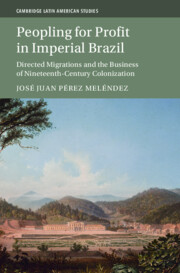 Peopling for Profit in Imperial Brazil
Peopling for Profit in Imperial Brazil Book contents
- Peopling for Profit in Imperial Brazil
- Cambridge Latin American Studies
- Peopling for Profit in Imperial Brazil
- Copyright page
- Dedication
- Contents
- Figures
- Tables
- Acknowledgments
- Note on Currency and Language
- Abbreviations
- Maps
- Introduction
- Part I Colonization’s Statecraft
- Part II Colonization Companies and the Colono Trade
- Part III Disentangling Companies and State
- Part IV Peopling the Country of the Future
- Conclusion
- Bibliography
- Index
- Series page
Introduction
What Is Colonization?
Published online by Cambridge University Press: 26 September 2024
- Peopling for Profit in Imperial Brazil
- Cambridge Latin American Studies
- Peopling for Profit in Imperial Brazil
- Copyright page
- Dedication
- Contents
- Figures
- Tables
- Acknowledgments
- Note on Currency and Language
- Abbreviations
- Maps
- Introduction
- Part I Colonization’s Statecraft
- Part II Colonization Companies and the Colono Trade
- Part III Disentangling Companies and State
- Part IV Peopling the Country of the Future
- Conclusion
- Bibliography
- Index
- Series page
Summary
The nineteenth century saw a transformation in the concept of colonization as political economists recast the term to refer to directed migration and settlement processes. Brazilian statesmen, intellectuals, and businessmen in the newly independent Brazilian Empire (1822–1889) embraced this new brand of colonization as an advantageous policy expedient because it aligned with old regime peopling practices, promised to resolve the question of slavery, and, significantly, held the prospect of individual profits, particularly if carried out by colonization companies. Brazilian engagement with colonization fit within a wider series of colonization processes unfolding within European empires or their overseas dominions as well as throughout the new republics in the Americas. Comparing and connecting the Brazilian case to concurrent peopling efforts across the globe unsettles understandings of colonization as part of a global settler revolution of which Brazil figured as a peripheral case. The key role played by companies as the harbingers of a new colonization paradigm underscores profit as a guiding principle in Brazilian colonization schemes in the nineteenth century.
Keywords
- Type
- Chapter
- Information
- Peopling for Profit in Imperial BrazilDirected Migrations and the Business of Nineteenth-Century Colonization, pp. 1 - 24Publisher: Cambridge University PressPrint publication year: 2024
